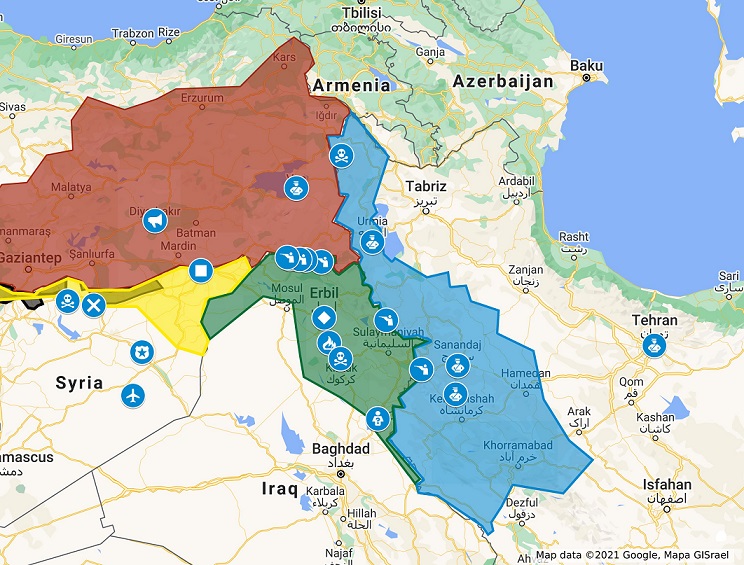1.7K
A weekly brief of events that occurred in the Kurdish regions of Iran, Iraq, Syria, and Turkey.
Iran
- Iranian security forces arrested at least eight people, including labor activists, in Sanandaj’s Abasawa sub-district on Saturday for attempting to hold an anti-regime protest on International Workers’ Day. The planned protest was inspired by poor working conditions and high unemployment rates in Iranian Kurdistan. That said, Iranian authorities also arrested a female labor activist named Vian Mohammadi in Tehran and a Kurdish man named Farouq Qazi in Kamyaran. According to the Hengaw Organization for Human Rights, the Iranian regime arrested at least 28 Kurdish political, environmental, and labor activists in April.
- Iranian border guards wounded two Kurdish border porters (Kolbars) in the Hawraman region and another named Saman Rasulzada near Sardasht. Moreover, the corpse of a Kolbar named Hassan Kachalanu, who was killed by Turkish border guards, was returned to his family for burial.
Iraq
- An ISIS (Da’esh) assault on two military posts north of Kirkuk on Saturday morning killed three Peshmerga and wounded two more. The attack began when Da’esh operatives covertly gathered near the two posts and fired on the Peshmerga, sparking clashes that lasted about an hour. Following the attack, Kurdish officials again warned of Da’esh’s ongoing exploitation of the security vacuum in Iraq’s “Disputed Territories” that was greatly exacerbated when Iraqi forces and Iranian-backed militias removed the Peshmerga from the region on October 16, 2017. On another note, Prime Minister of Iraq Mustafa al Kadhimi met with Iraqi and Peshmerga officials to discuss ongoing security issues in the region and, according to Secretary General of Ministry of Peshmerga Affairs Jabar Yawar, decided to facilitate improved coordination between Iraqi forces and the Peshmerga in an attempt to counter the ongoing Da’esh presence.
- A suicide bomber in Kirkuk was killed before he could detonate his vest in front of the city’s national security building. Concurrently, Da’esh terrorists kidnapped two shepherds and clashed with Iranian-backed militiamen west of Khanaqin.
- The Turkish military continued its ongoing incursion into Iraqi Kurdistan by establishing at least two new military posts near Kesta village. Meanwhile, Turkey’s Minister of Internal Affairs Süleyman Soylu announced plans to establish another military base in the Kurdistan Region, and the Turkish Minister of Defense Hulusi Akar visited Turkish soldiers stationed in the region and announced the “neutralization” of 44 Kurdistan Workers’ Party fighters. Granted, Iraqi Kurds fear Turkey’s invasion of the region under the pretense of fighting the PKK will lead to a permanent occupation like Turkish operations in Syria have. Simultaneously, the head of Kani Mase sub-district told Rudaw that at least 1600 dunams of farmland have been destroyed by Turkish air and artillery strikes.
- Iraq’s Kurdish parties announced candidates and coalitions for Iraq’s October 10 parliamentary elections, including a united list featuring candidates from the Patriot Union of Kurdistan (PUK) and the Change Party (Gorran). That said, though Kurdish parties in Kirkuk failed to create a united list, some smaller parties chose not to present candidates to avoid splitting the Kurdish vote, as they lacked the support required to win parliamentary seats. Iraq’s electoral system, unlike the previous one that designated provinces as electoral districts, now divides each province into multiple electoral districts.
Syria
- Turkey’s ongoing cut-off of water supplies from the Euphrates River to the Autonomous Administration of North and East Syria (AANES) has created a “disaster” for local farmers and damaged the region’s ecosystem, with local Kurdish officials claiming such tactics have affected nearly one million people so far. Meanwhile, hundreds of local residents in Manbij protested Turkey’s actions and criticized the international community’s ongoing silence. Turkey routinely cuts water and electricity supplies as a means of exerting political pressure on northeastern Syria’s Kurds.
- The US-led coalition supported several Syrian Democratic Forces (SDF) operations aimed at offsetting Da’esh’s increased operational tempo in northeastern Syria last week. One such operation led to the arrest of a senior Da’esh operative in charge of assassinations in Deir Ez Zor Governorate’s al Shafaa. The SDF also acted on a tip from locals and defused six IEDs in the governorate’s al Kasrah town. On another note, Da’esh terrorists remain engaged in combat with Syrian Arab Army forces, backed by Russian airpower and artillery, in Syria’s Badia (desert) region.
- Turkey resumed building a wall along the northern section of the strategic M4 Motorway near Ain Essa last week. The wall is intended to isolate the Turkish-occupied zones from territories controlled by the Assad regime and the SDF.
- The Assad regime intends to hold a Syrian presidential election on May 26. That said, the AANES will not participate or allow territories under its jurisdiction to do so, though residents in several parts of al Hasakah Governorate that remain under the control of the Assad regime will probably vote.
Turkey
- Turkey’s Court of Cassation upheld Kurdish politician Selahattin Demirtas’s four-year, eight-month prison sentence. At the same time, Demirtas and 105 Peoples’ Democratic Party (HDP) lawmakers are facing potential prison sentences due to ongoing legal actions known as the “Kobani Trial,” though the trials have been postponed until at least May 18 because of coronavirus lockdowns. On another note, Turkish police arrested at least ten HDP members and supporters in Batman and Van, including an environmental activist named Huseyin Akil. Turkish police also detained 220 people in Istanbul on Saturday for rallying on International Workers’ Day and accused them of breaking lockdown rules.
- The HDP criticized the Turkish government’s latest incursions into Iraqi Kurdistan and described them as a “mistake” that has been ongoing since 1983. The HDP also accused Turkish President Recep Tayyip Erdogan’s government of attacking Iraqi Kurdistan to divert attention from domestic issues like the economy.

